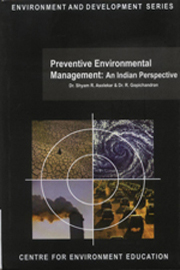Book contents
- Frontmatter
- Foreword
- Acknowledgements
- Contents
- List of Figures
- Summary
- Preface
- The Contents
- 1 The “Environment” in the Context of 21st Century
- 2 Indian Laws on Environmental Protection
- 3 The Framework and Implementation of Indian Environmental Policy
- 4 System Analysis: Knowing the Limits
- Preventive Environmental Management Tools
- Preventive Environmental Management Initiatives
- Overarching Issues
- References
- Bibliography
- Web-Resources
- About the Authors
- Abbreviations
- Index
1 - The “Environment” in the Context of 21st Century
from The Contents
Published online by Cambridge University Press: 05 November 2011
- Frontmatter
- Foreword
- Acknowledgements
- Contents
- List of Figures
- Summary
- Preface
- The Contents
- 1 The “Environment” in the Context of 21st Century
- 2 Indian Laws on Environmental Protection
- 3 The Framework and Implementation of Indian Environmental Policy
- 4 System Analysis: Knowing the Limits
- Preventive Environmental Management Tools
- Preventive Environmental Management Initiatives
- Overarching Issues
- References
- Bibliography
- Web-Resources
- About the Authors
- Abbreviations
- Index
Summary
The Preventive Environmental Management (PEM) framework reinforces the well-known adage “Prevention is better than Cure”. The relevance of this adage becomes most emphatic in the context of smothering, remedying and preventing environmental perturbations vis-à-vis industrial production systems. The uniqueness of the framework is based on the fact that it emphasizes a diagnostic approach. When this framework is superimposed on the complex scene of management of environmental externalities, the dynamics of “cause and effects” becomes clearer. Qualitative and quantitative correlates emerge in the process of diagnosis and raise relevant questions pertaining to the appropriateness of prevailing practices, based on which mechanisms of internalizing externalities could be evolved.
As a consequence of the worldwide liberalization, economies are moving towards international trade. As a result, issues relating to technology adaptations, trade linkages, social imperatives including impact avoidance and mitigation are magnified. Additionally, the results of this diagnosis help define or reinforce adaptations in planning and implementing appropriate interventions. The link between policy, plans, programmes and projects will, thus, become explicit.
The present chapter takes note of the scope and rigor of this framework in interpreting the status of India's preparedness to take on the challenges posed by negative externalities due to industrial activity. Accordingly, the “unfinished agenda” has been articulated to address the imminent challenges faced by India in the light of some salient features of present status of our country's environment.
Which Way the Winds are Blowing Worldwide?
Systems of environmental management and governance have been metamorphosing at high rates, as a function of the degree of complexity of the environmental issues they choose to address.
- Type
- Chapter
- Information
- Preventative Environmental ManagementAn Indian Perspective, pp. 13 - 38Publisher: Foundation BooksPrint publication year: 2005



